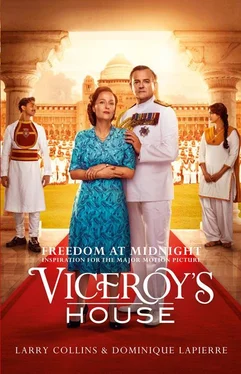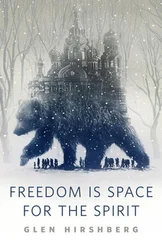Those were the attractions and challenges which determined us to write Freedom at Midnight . The publication of the book’s original edition in 1975 was blessed by a phenomenon particularly gratifying to authors – enormous popular success accompanied by wide critical acclaim. It inspired, according to screenwriter John Briley, much of his Academy Award-winning script for Richard Attenborough’s film Gandhi . A bestseller in Europe, the United States and Latin America, the book’s most significant impact was, understandably, on the Indian sub-continent. It was translated into every Indian dialect in which books are published, an accolade once reserved for authors such as Charles Dickens or Victor Hugo. It further received the flattering, if illegal, compliment of imitation in the form of at least 34 pirated editions. In Pakistan, however, an embarrassed government banned the book. Why? We mentioned the indisputable, human failing of the Islamic nation’s founder – he was not averse to eating a slice of bacon with his morning eggs.
In reviewing our original text for this new fiftieth anniversary edition, we found little that we felt demanded revision or rewriting. We did, however, feel that in view of the half-century which has passed since the events described in the book and the years since its initial publication, there were some parts of the story which merited an updating. To do that, we returned to our thirty hours of tape-recorded interviews with Lord Mountbatten and the other original sources which underlie the book.
As India and Pakistan mark the fiftieth anniversary of their independence, the antagonism which has governed their relationship for half a century continues unabated. Both countries now possess nuclear weapons and have threatened to employ them if menaced, making the sub-continent one of the most potentially dangerous regions on earth. Each nation regularly accuses the other of fomenting terrorism on its territory, India seeing the hand of Pakistan behind the guerrilla movement in Kashmir, and Pakistan accusing India of being behind the recent urban violence in Karachi and parts of the Punjab.
At the heart of the dispute between them is, of course, the intractable problem of the lovely Vale of Kashmir, whose overwhelmingly Moslem population lives under increasingly repressive Indian rule. The United Nations has called repeatedly for a plebiscite on the area’s future, a referendum which would almost certainly result in an overwhelming majority for either independence or union with Pakistan. What makes the problem so intractable, however, is the near-certainty that any Indian government which would even contemplate either of those possibilities would risk unleashing violence by Hindu militants on India’s Moslem minority, violence that would probably far exceed anything Kashmir has witnessed to date.
Lord Mountbatten is blamed by most Pakistanis for Kashmir’s post-independence decision to join the dominion of India rather than Pakistan. The accusation is, in fact, both unfair and untrue. On the contrary, Mountbatten probably came closer than anyone has since to effecting a peaceful solution to the problem. With considerable difficulty, he extracted from India’s political leaders Vallabhbhai Patel and Jawaharlal Nehru a pledge to accept a decision by Kashmir’s Hindu Maharaja Hari Singh to join his state to Pakistan. (Under the terms governing the transfer of power, the rulers of India’s princely states were to accede to the dominion either of India or of Pakistan, taking into account the desires of the majority of their populations.)
Armed with that agreement, Mountbatten flew to Srinagar shortly before 15 August, determined to convince Singh to join his state to Pakistan. He urged that course of action on the Maharaja while driving in his station-wagon for a day’s trout fishing in the Trika River.
‘Hari Singh,’ he told the prince, ‘you’ve got to listen to me. I have come up here with the full authority of the government of the future dominion of India to tell you that if you decide to accede to Pakistan because the majority of your population is Moslem, they will understand and support you.’
Singh refused. He told Mountbatten he wanted to become the head of an independent nation. The Viceroy, who considered Singh ‘a bloody fool’, replied: ‘You just can’t be independent. You are a landlocked country. You’re oversized and underpopulated. Your attitude is bound to lead to strife between India and Pakistan. You’re going to have two countries at daggers drawn for your neighbours. You’ll end up becoming a battlefield, that’s what will happen. You’ll lose your throne and your life, too, if you’re not careful.’
Singh persisted, however. He refused to meet officially with Mountbatten again during the Viceroy’s visit. Independence Day came and went and still Hari Singh vacillated, making no official decision on Kashmir’s future. When tribesmen organized and armed by Pakistan descended on his capital, Srinagar, later that autumn, Singh sent out an SOS for help to New Delhi. At that point, it is true, Mountbatten, now Governor-General of the new Dominion of India, told Nehru that he could not legally order Indian troops into Kashmir unless the Maharaja signed a formal act acceding to India. An emissary was dispatched to Srinagar with an act of accession. Singh signed it in great haste and Indian troops were airlifted to Kashmir. They are still there today, and the problem born that autumn day continues to poison relations between the two nations.
Many readers of Freedom at Midnight noted that we did not mention in its pages the oft-cited rumours of a love affair between Lady Edwina Mountbatten and Jawaharlal Nehru. Our decision not to invoke those rumours was deliberate. While there is absolutely no doubt that a special bond of affection united Nehru and Lady Mountbatten, there was no evidence then nor is there any now that their relationship was anything other than platonic. Nehru’s own sister, Mme V.L. Pandit, volunteered to us in a conversation that had no bearing whatsoever on the Nehru – Edwina relationship that her brother had become sexually impotent towards the end of his marriage. That condition, she said, caused the end of the marriage and plagued Nehru for the rest of his life. Given the premium then put on masculine sexuality in Indian society, we found it very difficult to imagine that a sister would lie about such a matter involving a beloved brother. Furthermore, the valet who cared for Nehru’s official bungalow during two visits Lady Mountbatten paid to India’s Prime Minister after independence swore he had seen no evidence whatsoever that the couple had shared a bedroom.
Mountbatten did volunteer that he discussed with his wife the secrets of his continuing negotiations with India’s leaders and that, on occasion, he used her as a vehicle to pass information informally to Nehru which he could not transmit to him officially.
In the years which followed the publication of Freedom at Midnight we, the authors, were on occasion accused of being pro-Mountbatten in its pages. To that charge we plead guilty. In general, there were two major criticisms levelled at the last Viceroy: that he moved too fast in handing over power to India and Pakistan in August 1947, and that he did not do enough to prevent the terrible slaughters which followed that event.
No one, of course, will ever know how many people died in those awful weeks. Mountbatten preferred to use the figure 250,000 dead, an estimate undoubtedly tinged with some wishful thinking. Most historians of the period place the figure at half a million. Some put it as high as two million.
Whatever that tragic toll, with one exception no one in authority in India at the time foresaw a calamity of such magnitude. In the course of our work, we read all the weekly reports submitted to the Viceroy by the governors of India’s provinces. Those officials, men like Sir Evan Jenkins in the Punjab and Sir Olaf Caroe in the North West Frontier Province, represented the best and wisest products of British rule in India, the mandarins of the Indian Civil Service. They were advising a man whose Indian experience was counted in months, not years. Yet none of their reports foresaw a wave of violence even remotely comparable to that which followed Partition.
Читать дальше












